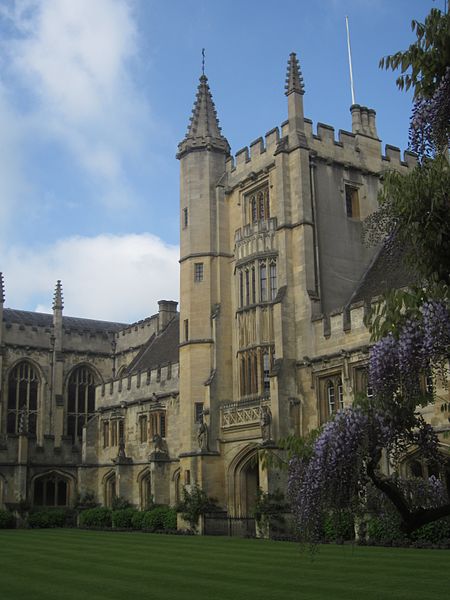 |
| Magdalen College, Oxford |
Somehow or other I succeeded in leaving this poem out of the New and Collected (2008). I did not mean to, it just went missing. Then recently, when I was in Munich, the man who had invited me, Helge, said it was this poem that I had read some fifteen years before at Cologne, that he remembered and that other people had liked so much.
Last night I read it at LUMEN, the cold weather harity in London, and one member of the audience has written to me and asked where she could find it. The answer was, 'nowhere'. But I have found it among old files, and here it is.
It was written for our daughter, Helen, just about to go up to Oxford in 1994, the year we moved to Norfolk. It refers to the Yeats poem, of course, and quotes it too, but it refers to much else. Each time I wrote one part another part demanded to be written so in the end there were seven. It was both fun and moving to write.
Prayer
for my Daughter
1.
So here we are and here’s my
stanza,
like a Clementi cadenza
a penny-plain extravaganza,
just to keep things neat but
sprightly
in what might otherwise
politely
decline into a straight
unsightly
father-to-daughter patronising
advisory misadvising
lecture on vague points
arising,
a Yeatsian prayer to admonish
characteristics too Maud
Gonneish,
Fenian or Amazonish.
2.
My stanza’s nineteenth century
capers
are out of time. I read the
papers
and know the new opinion
shapers,
I know their loose, sincere
demotic
ironies and semiotic
quiddities, but I’m Quixotic:
though windmills are as quaint
as giants,
I continue in defiance
of gravity or modern science
rhyming like a man demented
dolphin torn and gong
tormented
till the giants have relented.
3.
Darling, tonight the whole
horizon
closed like a lid. The traffic
sighs on
rainy tarmac, men flit like
flies on
jets of wind, the river
fractures,
and a streetlight manufactures
a wealth of frazzled broken
textures.
So beautiful: the petrol
station’s
amber flatness, the quotations
of lit shopfronts, the
impatience
of running clouds. The winter
races
into darkness, interlaces
bodies in its breathing
spaces.
4.
You see, I want to turn this
patter-
song to deeper, graver matter,
more throttle more carburettor
I want to be a souped up,
solemn,
portentous father, wise as
Solom-
on not just a gossip column,
someone you’ll take seriously
whose works you’ll study
furiously
not discard imperiously
from some theory-laden
high-rise
nor swat and squash flat,
wasp- or fly-wise.
but approve, applaud and
lionise.
5.
Walking last night I sought an
image
to offer you, a kind of homage
to the wind’s wild scrape and
scrimmage,
and noticed how the very
cheapest
vulgarisms struck the deepest:
the Woolworth lights, a
buckled leaf pressed
to the pavement, a crisp
packet
flying in the gust. I took it
home with me, to store and
stack it
in memory, imagination,
to use it in some combination:
a poem finding its occasion.
6.
Some quick advice? Well just a
quickie:
Beware the sentimental-sticky,
Beware the choosy and the
picky,
Beware all those who talk in
torrents
The snobs who earned the
strict abhorrence
Of poor pale sickly
D.H.Lawrence,
Beware the Oxfordly superior,
Beware those with a smooth exterior,
The cynic wiser and
world-wearier,
Beware the shady and the
murky,
Beware the
overprecious-quirky,
Beware your father talking
turkey.
7.
Out on your own. The
eighteenth hurdle
safely past. The tales I’ve
heard all
tend to make a man’s blood curdle,
so to the prayer (I’m feeling
prayerful):
Darling be wise, be good, be
careful,
be water, fire and earth and
air-ful,
find images beyond the kitchen
that women used to bake and
bitch in
from Halicarnassus to plain
Hitchin,
may you, in darkness, be that
changing
wind and light, your mind
free-ranging,
sea-like, unplumbed, salt,
estranging,
tender, yes, but not
kid-gloving
neither too mousy, nor too
shoving,
be fortunate, be loved, be
loving
be all of these, be kind,
far-seeing,
in short, beyond the you- and
me-ing
all that befits a human being,
what human beings may be made
for:
life, unearned, unknown,
unpaid for,
that you were celebrated,
prayed for.
